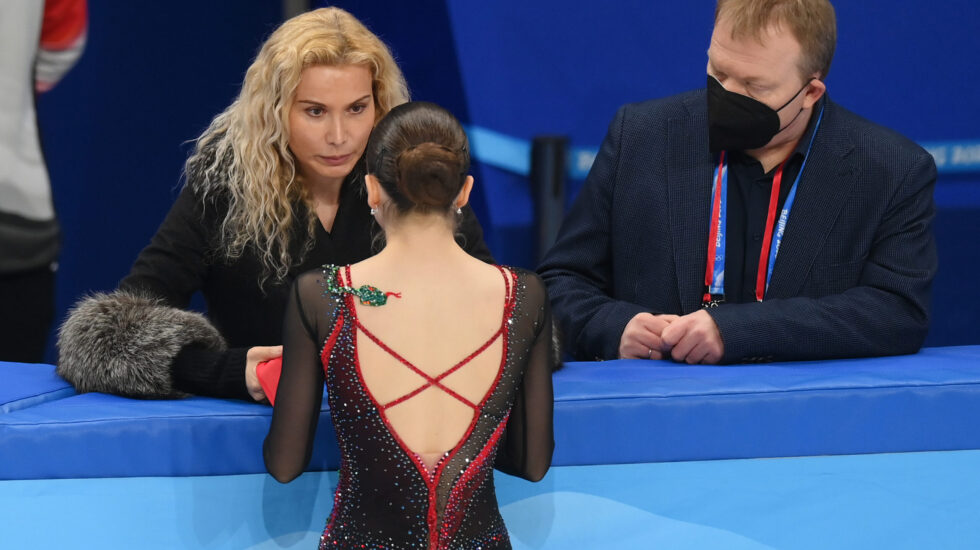The sad story of Kamila Valieva’s tumultuous week at the Beijing Olympics is a reminder of the intense pressure placed on young athletes and a yet another demonstration of Russia’s callous disregard of its citizens’ well-being, even when the world is watching.
The 15-year old figure skater was widely considered a gold medal favorite; the 2022 Games were supposed to be her coronation. Instead, scandal ruined her Olympic debut and she skated off the ice in tears. Her coach didn’t offer consolation. Instead, she yelled at the teen.
Earlier this week, it was revealed that Valieva had testified positive for a prohibited substance back in December. Her handlers offered an implausible explanation, suggesting that she accidentally ingested the drug. They even enlisted her grandfather in this half-baked defense, having him provide video testimony saying that the drugs were his. But two other legal substances were found in Valieva’s system that are designed to bolster the effects of the prohibited one.
The International Olympic Committee, an organization with a deeply corrupt history, hid behind a ruling from the Court of Arbitration for Sport and allowed Valieva to compete while the drug scandal was being investigated. If she finished in the top three in the individual competition, as expected, there would be no medal ceremony. Only when the probe was complete – or when the media stopped paying attention – would the winners receive their hardware.
But all the scrutiny clearly impacted Valieva, who quite literally stumbled to a fourth place finish. As soon as she got off the ice, Russia’s infamously unfeeling coach, Eteri Tutberidze, yelled at her ““Why did you let it go? Why did you stop fighting?”
IOC President Thomas Bach expressed dismay at Tutberidze’s reaction, saying at a Friday press conference “When I afterwards saw how [Valieva] was received by her closest entourage, with such, what appeared to be a tremendous coldness, it was chilling to see this. Rather than giving her comfort, rather than to try to help her, you could feel this chilling atmosphere, this distance.”
A gold medal from team competition is the teen’s temporary consolation prize, although that may be taken away pending the outcome of the ongoing inquiry into her drug use.
Wherever that probe leads, it’s clear Valieva was the plaything of a corrupt Russian system. NBC’s Mike Tirico, who is generally restrained in his commentary, blasted the IOC and Valieva’s handlers on Thursday night in an impassioned monologue, calling the 15-year-old “the victim of the villains.” (Watch Tirico’s full video essay here.)
“The coaches and National Olympic Committee surrounding Kamila Valieva, whether they orchestrated, prescribed or enabled all of this is unclear, but what is certain: They failed to protect her,” Tirico said.
Meanwhile, Russia’s other top female skaters, 17-year-old Anna Shcherbakova, who won the individual gold, and 17-year-old Alexandra Trusova, who won the silver, also expressed dissatisfaction.
The gold medal winner said she felt “empty.” Trusova expressed bitterness about the scoring, saying “I hate this sport,” and pledging “I won’t go onto the ice again.”
She later walked back those remarks, blaming homesickness. But The Associated Press notes that Trusova has a tortured history with her coach:
Of the three teenagers, Trusova has had the most fractious relationship with Tutberidze. She switched coaches briefly, returning to the Tutberidze camp in May of last year. And her music selection seemed to send a message. She danced her long program to “Cruella” from the movie soundtrack.
Tirico summed up the situation eloquently in his Thursday night monologue, saying “It’s time for the IOC to stand up, whether it’s about blocking Russia from hosting events for a very long time or stringent and globally transparent testing for Russian athletes going forward. If swift action from the top of the Olympic movement does not happen quickly, the very future of the Games could be in jeopardy.”



